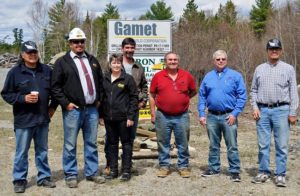Indigenous students set to mine their careers in Temagami

By Kelly Anne Smith
TEMAGAMI—Indigenous students will be getting a unique opportunity to gain hands-on experience in the mining industry. They also will be encouraged to carry on traditions while learning the trade at Nimke Mining Services.
The students will receive surface diamond drilling training while looking for gold in an active pit mine in the Temagami area.
Temagami First Nation and the City of Temagami are part of the venture with Nimke Mining Services that has been a year-long process. The pit was officially opened with an inaugural ceremony on May 12 at the Lake Temagami Access Road.
Nimkie’s CEO Randall Becker explains the venture has multiple purposes. The mine will provide aggregate to Temagami First Nation, the Township of Temagami, and the cottagers of Lake Temagami.
Becker’s other company, Gamet Gold Corporation, will be looking for gold and possibly platinum and palladium in the 8000 metres they can access. It would also welcome partnerships from First Nations or Métis of Ontario to progress.
Becker has been striving to improve relationships between First Nations and the mining industry for 10 years with Nimke Mining Services Corp. Becker is a member of Temagami First Nation.
There has been a stigma of the mining industry taking resources from Indigenous territories and leaving toxic messes behind.
The January edition of the Canadian Mining Journal calls for actions of respect to be shown to First Nation communities involved with mining projects. Marilyn Scales says consultations should begin as soon as a project is proposed and that profits are shared.
The Indigenous mining industry couldn’t find enough skilled trades people from First Nation communities so Becker set out to create opportunities on First Nations. Now a large part of Becker’s work consists of training people for the needed positions in the mining industry.
According to Becker, at the base of Nimke’s training is excellent work ethics taught by experienced trades’ people.
The drill bits are from a new company, Asabanaka Drill Services, of Kasabonika Lake First Nation. They have just partnered with Raymond Daneault of Temagami, an experienced diamond drill supervisor and project manager.
“So the First Nation now has a diamond drilling company that is not only based in Kasabonika Lake First Nation, but they also have Temagami and locations at both ends of the province to service diamond drill contracts,” stated Daneault.
The process may be called diamond drilling but geologists are looking for commodities. Diamonds are on the drilling bits that cut cylindrical core samples.
While mining, Becker is focusing on educating future leaders and teachers of Indigenous communities.
“I’ve drawn on the experience of competent individuals in the industry such as Ed McVeigh from Sudbury,” noted Becker. “He’s the owner of Canadian Driller Training and works with the training aspect. Our geologist is Tim Hannon from Guelph.”
Becker’s accredited courses are delivered in First Nation communities. He says that way families stay together during the training period. The end result is that communities benefit from the trained members becoming skilled trade’s men and women by maintaining contracted work local.
“We don’t just sign with communities. We try to further them along and help in any way we can,” expressed Becker. “What I want to see is people, especially Aboriginal people, to leave our school with enough knowledge to make them feel comfortable to continue their learning experience on the job in a real setting. The only way to do that is to be on site in an active pit.”
Becker adds that Nimke’s educational experience is unique in that time is given for traditional ways.
“It’s a way of life. It’s a traditional thing to do. It’s for food supplementing for the families. But it is also important family time,” noted Becker. “With our people, we bring the kids out, whether it’s goose hunting, fishing or moose hunting. It’s necessary for people to carry on those traditions.”
The Class 11 aggregate pit will require drilling, crushing, blasting and quality control.
“Offering hands on experience to our students gives them the experience they need to be able to succeed in the industry,” stated Becker.


